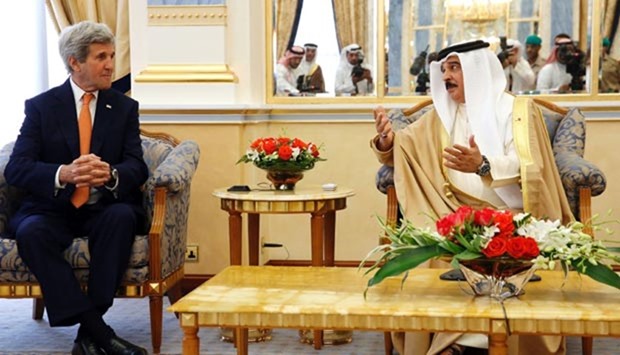US Secretary of State John Kerry on Thursday urged Iran to help end the wars raging in Yemen and Syria, criticising the Islamic republic's "destabilising actions" in the Middle East.
On the first visit by a US chief diplomat to Bahrain since 2010, Kerry also told authorities in Manama accused of discriminating against the country's Shia majority that respect for human rights was "essential".
Kerry was also to meet his other Gulf Arab counterparts later on Thursday, two weeks before President Barack Obama is scheduled to attend a summit of the Gulf Cooperation Council in Riyadh when Washington's Middle East policy is likely to come under the microscope.
Speaking during a joint news conference with Bahraini Foreign Minister Sheikh Khalid bin Ahmed al-Khalifa, Kerry condemned "the destabilising actions of Iran, which the US takes very seriously".
Kerry said Tehran should "help us end the war in Yemen... help us end the war in Syria, not intensify, and help us to be able to change the dynamics of this region".
Tehran and the Gulf states back opposition sides in Syria and Yemen.
Last year Iran struck a landmark deal with world powers scaling back its nuclear programme, which has led to the lifting of international sanctions on the Islamic republic.
Sheikh Khalid, whose government accuses Iran of stoking persistent protests among the kingdom's Shias, echoed Kerry's call.
Iran's "interventions through proxies in several parts of our region (are) continuing unabated," the Bahraini foreign minister said.
"We want to see them help" in trying to "reach a political solution" in war-ravaged countries but "yes, we do want to see Iran change its foreign policy," he said, speaking alongside Kerry.
Tehran argues that it is Saudi Arabia and its Gulf allies that are sowing instability in the region with their air strikes in Yemen and support to the opposition in Syria.
'Full' Yemen ceasefire
All the Gulf Arab states, apart from Oman, are taking part in a Saudi-led coalition that has been battling Iran-backed rebels in Yemen since March last year, in a war which the UN says has killed around 6,300 people.
Human Rights Watch said on Thursday that bombs supplied by the US were used in coalition air strikes on a market in Yemen that killed at least 97 civilians including children last month.
Asked to comment on the report, Kerry said he did not have "solid information" on weapons used in Yemen.
The US has been exerting efforts to "try to secure a full ceasefire in Yemen", he added.
Yemen's warring parties have agreed to observe a UN-brokered ceasefire from midnight Sunday which will be followed by peace negotiations in Kuwait on April 18.
The Gulf Arab states have also been staunch backers of Syrian rebel groups fighting to overthrow President Bashar al-Assad's regime since 2011.
Iran, with Russia, has been among the regime's main supporters in the conflict that has killed more than 270,000 people and pushed nearly 5mn into exile.
Kerry will also discuss the situation in Iraq, Lebanon, and elsewhere in the region during his meeting with Gulf foreign ministers, a US official said.
Saudi Arabia, Bahrain and the UAE have carried out air strikes against the Islamic State jihadist group in Syria as part of a US-led military coalition.
"We're satisfied, I think, with the overall level of support that we're getting from the Gulf states in the coalition," the US official said.
On Bahrain, Kerry urged authorities to adopt an "inclusive political system".
He said he and Sheikh Khalid "had the chance to discuss the ongoing effort to address and to reduce sectarian divisions here in Bahrain and elsewhere".
"I appreciate the seriousness with which he considers this issue," Kerry said.
"We all welcome steps by sides to create conditions to provide for greater political involvement for the citizens of this great country," he added.

